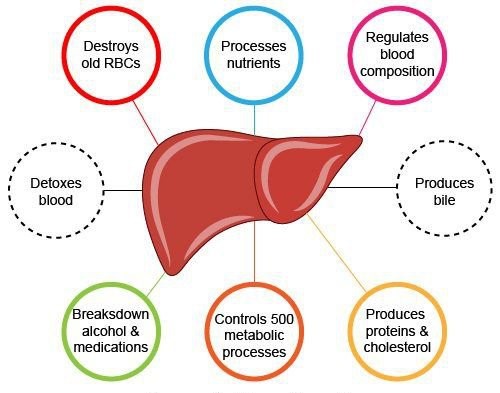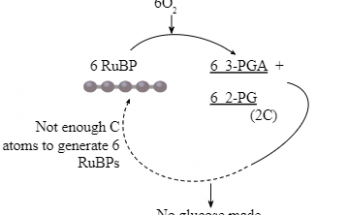The Liver is a large organ located in the right upper abdomen, below the diaphragm. It is the largest internal organ in the human body. It is divided into two main lobes, and further segmented into smaller lobes called lobules. These lobules are made up of specialised liver cells called hepatocytes, which are responsible for the various functions of the liver. The liver is supplied with blood from two sources – the hepatic artery, which supplies oxygen-rich blood, and the portal vein, which carries nutrient-rich blood from the digestive organs.
Also Check – Liver – Structure, Functions, Disorders, Regeneration
Functions of the liver
The liver is responsible for many important functions in the body, which are as follows-
Bile Production and Fat Breakdown
An important function of the liver is the production and secretion of bile, a fluid that aids in the digestion and absorption of fats. Bile emulsifies fats, making them easier to break down and absorb in the intestines.
Also Check – Emulsification of Fats
Nutrient Processing and Balance
The liver acts as a central hub for processing nutrients obtained from the stomach and intestines. It breaks down, balances and creates essential nutrients needed by the body to ensure their efficient utilisation.
Protein Synthesis
Certain proteins that are important for blood plasma are synthesised in the liver. These proteins play a crucial role in maintaining overall health and supporting various bodily functions.
Cholesterol and Fat Metabolism
The liver is responsible for the production of cholesterol and special proteins necessary for the transport of fats through the body. It helps regulate cholesterol levels and plays a key role in overall fat metabolism.
Glucose Regulation
Maintaining stable blood glucose levels is an important function of the liver. It stores excess glucose and releases it when needed. In this way, it helps regulate blood glucose levels and ensures a steady supply of energy to the body.
Regulation of Chemical Levels
The liver is responsible for controlling and maintaining optimal levels of various chemicals in the bloodstream. Through its intricate mechanisms, it balances the compounds necessary for bodily functions.
Hemoglobin Processing and Iron Storage
The liver processes haemoglobin and extracts and stores iron from old red blood cells. This iron is crucial for the production of new blood cells and other vital physiological processes.
Synthesize fetal Red blood cells
Liver Synthesize fetal red blood cells: It produces red blood cells only in embryos. (In adults, RBCs are produced in the bone marrow).
Detoxification
One of the most important functions of the liver is to detoxify the blood. It metabolises drugs, toxins and other harmful substances so that they can be more easily eliminated from the body, which benefits overall health.
Blood Clotting
The liver produces important proteins that are necessary for blood clotting. This is important to prevent excessive bleeding and protect the body from infections caused by wounds.
Immune Function
The liver makes an important contribution to the body’s immune tsystem. It produces immune factors, including white blood cells and antibodies, which actively fight infections and remove bacteria from the bloodstream.
Bilirubin excretion
Bilirubin, a yellow pigment produced when old red blood cells break down, is efficiently broken down by the liver. It prevents the accumulation of bilirubin by excreting it through the bile and urine, ensuring proper waste disposal.
Storage of nutrients
The liver serves as a storehouse for various essential nutrients, including vitamins (A, D, E, K), minerals (iron, copper, zinc) and other vital compounds (folate, niacin, thiamine, riboflavin). It releases them into the bloodstream as needed, contributing to a balanced nutrient budget.
Excretion of waste products
Finally, the liver helps to eliminate waste products. It eliminates waste products, including bilirubin, through bile, which is then excreted from the body in the form of stool, contributing to the overall detoxification process.


9 Comments on “14 IMPORTANT FUNCTION OF THE LIVER”